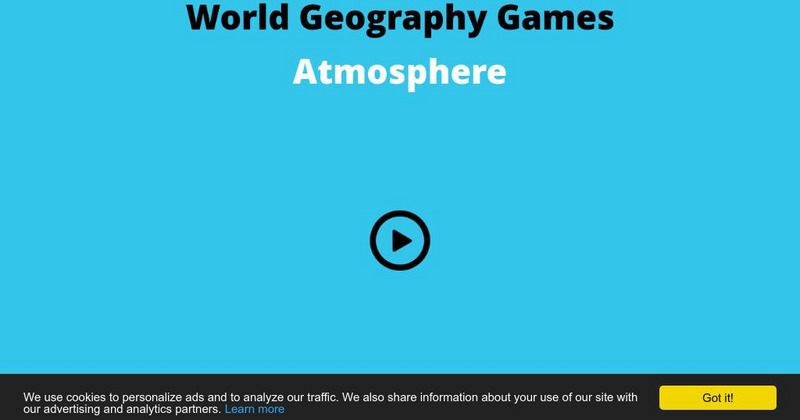Curated OER
Heating the Atmosphere
Students construct a thermograph for maximum and minimum temperatures for the 2-week period. They illustrate how the earth's atmosphere is heated by convection and conduction currents and evaporation of water.
Curated OER
A Model of Earth's Atmosphere
Students make a model of the four layers of Earth's atmosphere that represents the characteristics of each layer.
Curated OER
Using Imported Data in Excel
Students import atmospheric data from the internet. In this earth science lesson, students graph the data they collected. They complete the worksheet after the activity.
Curated OER
Atmospheric Shielding from Radiation III
In this radiation worksheet, students compare the efficiency of planetary atmospheres to shielding from radiation. This worksheet has 2 problems to solve.
Curated OER
Great Expectations 4
Students comprehend how Dicken's set piece on snobbery. They discuss how Lean uses costume, actors' non-verbal communcication and props to convey Victorian class customs, distinctions, and snobbery. Students are shown "The Jolly Bargee"...
Curated OER
Plants Releasing Water
Third graders investigate how water is released from different plants into the atmosphere. They observe and investigate two types of plants with domed lids with condensation and communicate those observances and inquiries on an in-class...
Curated OER
Science: Discovering Earth's Air Prressure
Fourth graders discover earth's air pressure through observation of several experiments. In the "Experiment of the Leaky Bottle," they observe how air pressure forces water out of the lowest hole farther than the holes above it. In...
Curated OER
Wind Dynamics and Forests
Students perform experiments to explore differences in wind speed and forest density. Through experimentation and observation, students realize that changes in vegetation affect the atmosphere and wind conditions. They create a model...
Curated OER
How Do They "Whether" the Weather
Sixth graders are engaged in learning about weather systems, weather patterns and how to create a local forecast through a KCTS video called: "How Do They "Whether" the Weather?" Students actively learn how movements in atmosphere are...
Curated OER
The Climate Challenge Game
Young scholars explore climate change, its impacts and possible solutions. They play a television-style quiz challenge game. Students discuss the topics pertaining to global, local, and personal solutions to climate changes.
Curated OER
The Weather Classroom: Atmosphere
Students explore the planets and their atmospheres online. They write the story of "Goldilocks and the Nine Planets" to explain how each planet's atmosphere differs from Earth's. They design a viable life form.
Curated OER
The Air Up There!
Students create a model of a column of air and discover one of the reasons why low and high pressure systems exist and why low pressure is often associated with bad weather.
Curated OER
Out Of Sight Air; Weather
Fourth graders conduct an experiment to get them thinking about the invisibility of air, and to prove that air has weight.
Curated OER
Atmosphere Molecules
Students use foam packing pieces to represent molecular positioning inside the four layers of earth's atmosphere. This lesson help students visualize that molecules become thinner as one ascends higher in the atmosphere.
University Corporation for Atmospheric Research
Ucar: Sun and Space Weather Image Gallery
Images and diagrams of the Sun, solar phenomena such as sunspots and flares, space weather, Earth's magnetosphere and upper atmosphere, the aurora, and more.
University Corporation for Atmospheric Research
Ucar: Atmosphere Images
Photos, diagrams, and other images related to climate and climate change.
CK-12 Foundation
Ck 12: Earth Science: Temperature of the Atmosphere
[Free Registration/Login may be required to access all resource tools.] How different temperature gradients separate the atmosphere into distinct layers.
Lawrence Berkeley National Laboratory
Berkeley Lab: University of California: Electromagnetic Radiation
This page defines electromagnetic radiation. Included are links to more information.
National Institutes of Health
National Institute of Environmental Health Sciences: Atmosphere & Health
Find out how the atmosphere, climate, and the greenhouse effect are related. While the atmoshere can protect us, it can also be harmful to our health.
Other
National Pollutant Inventory: Background Information
This site focuses on water and air pollution in Australia, with a brief mention of sea breezes.
World Geography Games
World Geography Games: Atmosphere
Identify the layers of the atmosphere through this interactive quiz.
Ducksters
Ducksters: Earth Science for Kids: Weather: Clouds
Kids learn about clouds including how they form, levels, fun facts, and types of clouds such as cirrus, cumulus, and stratus.























